Turmeric is trending because it has been researched as an antioxidant, anti-inflammatory, and protective agent against chronic diseases.
All this from the yellow root of an Asian rainforest plant.
If you want to work in a super healthy supplement to hedge your on-the-go lifestyle, turmeric is one of the best.
Because of the popularity of turmeric, there are hundreds of supplements on the market. Our research team has found the best.
1. Gaia Herbs Turmeric Supreme
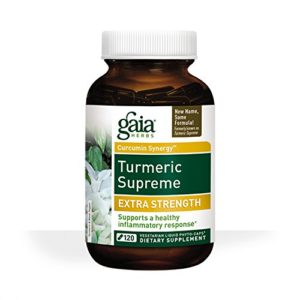
Click here for the lowest price on Amazon
You might call Gaia Herbs Turmeric Supreme a “high end” turmeric supplement. Instead of cramming turmeric powder into a cellulose capsule, Gaia Herbs dissolves it in liquid for maximum potency and absorption.
The liquid delivers a combination of turmeric extracts acquired by different methods, which is an interesting take. Usually when you hear “extract” you don’t think too much about how the compounds were extracted. Gaia does. They use both ethanol and supercritical CO2 extraction to squeeze out as many active compounds as possible.
Of course, you do have to pay extra for this careful attention to processing and to packaging, but according to most users, it’s well-worth the cost.
2. Solgar Turmeric Root Extract
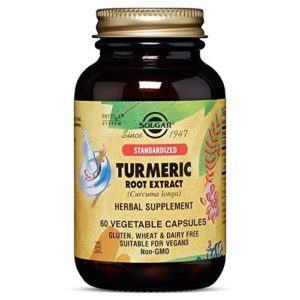
Click here for the lowest price on Amazon
Solgar may not look like the most exciting turmeric supplement out there, but when it comes to cost-effectiveness, it can’t be beat. It provides about 80% as much turmeric extract as a typical supplement on the market, but for half the cost! The ingredients are fairly straightforward; 400 mg of turmeric extract per capsule, and notably, no black pepper extract like many of the competitors.
Those savings get passed down to you. The other ingredients are pretty unremarkable; just some binders and antioxidants to increase shelf life. If all you want is a cheap, effective, and simple turmeric extract supplement, look no further than Solgar.
3. New Chapter Turmeric Force
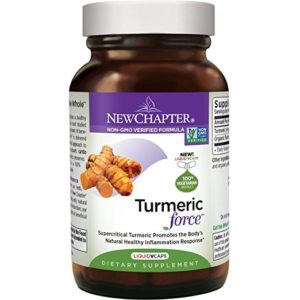
Click here for the lowest price on Amazon
New Chapter makes a point of emphasizing how the turmeric is extracted from the plant. Like Gaia Herbs, they also use both an ethanol process and a supercritical CO2 process to get the extract from the raw plant material.
As is the case with Gaia, this does add extra cost to the supplement, so only go for New Chapter if you want a very high-quality extract that captures as much of the raw plant material as possible.
4. BlueBonnet Turmeric Root Extract
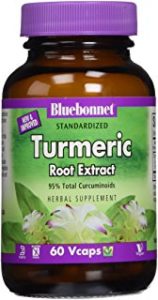
Click here for the lowest price on Amazon
BlueBonnet has made a name for itself as a manufacturer of simple and high-quality supplements, and that reputation is deserved in the case of their turmeric root extract supplement. With no fluff and no extra ingredients, BlueBonnet delivers 400 mg of turmeric root extract per vegetarian capsule.
The company also guarantees that the supplement is free from all common allergens; many other competitors make their products on the same equipment that is used on wheat, dairy, or soy-based supplements and as such can’t make such a claim. It’s well-reviewed and very effective, but you do have to pay up for this boutique approach: it’s pretty spendy compared to many of its competitors, which hurts its ranking a bit. Still, if you’ve got cash to drop, it’s hard to go wrong with BlueBonnet.
5. Organic India Turmeric Formula
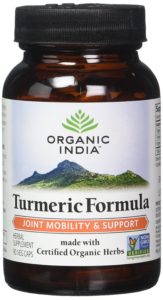
Click here for the lowest price on Amazon
Organic India puts a unique spin on their turmeric supplement by adding ginger root extract into the mix. Ginger is reputed to be a powerful supplement in its own right, though there isn’t much in the way of specific research on combining the two.
The turmeric dose is pretty standard, at 400 mg per capsule, though Organic India does note that they take the extract from two slightly different parts of the plant. The defining attribute of the supplement, though, is the ginger, so make this the deciding factor for you.
6. Lumen Naturals Turmeric Curcumin 1200
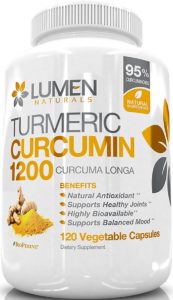
Click here for the lowest price on Amazon
Lumen Naturals provides a high dose of straight turmeric root extract, combined with a few boosters of additional bioactive compounds. Each cellulose (i.e vegan) capsule provides 600 mg of pure turmeric root extract alongside 50 mg of highly purified curcuminoids, the primary bioactive compounds in turmeric root and 5 mg of BioPerine, which is a proprietary black pepper extract preparation.
The high amount of turmeric, plus the boost of the curcuminoids, makes Lumen Naturals a very solid choice, though it’s not the most cost-effective or the best for a strict purity fanatic.
7. BioSchwartz Turmeric Curcumin
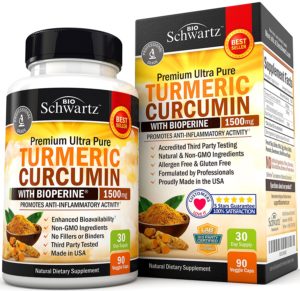
Click here for the lowest price on Amazon
BioSchwartz follows the standard model when it comes to turmeric supplements: a hefty dose of unprocessed turmeric root, alongside a small amount of the purified, concentrated curcuminoids, and a small dose of BioPerine.
In this case, the supplement provides 500 mg of turmeric root, 50 mg of purified curcuminoids, and 3.3 mg of black pepper extract (BioPerine). It’s in a cellulose capsule, and it’s extremely popular online, but despite this, it’s a bit mediocre. BioSchwartz Turmeric Curcumin is pretty cost-effective, but it doesn’t really distinguish itself in any particular way, good or bad.
8. Me First Living Turmeric Curcumin
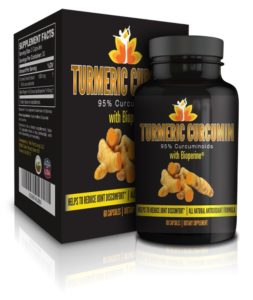
Click here for the lowest price on Amazon
Popular and beloved–that’s the most accurate way to describe Me First Living’s turmeric supplement. What’s it got going for it? It’s a fairly cost-effective supplement that delivers a no-nonsense turmeric extract. 500 mg per capsule, plus a small amount of BioPerine, like many of the other turmeric extracts on the market.
This is all fine and good, but there are no “extras” like other companies offer, like turmeric from a different extraction method or a highly purified concentrate booster. Me First Living falls into the good but not outstanding category.
9. Doctor’s Best High Absorption Curcumin from Turmeric Root
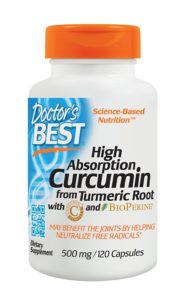
Click here for the lowest price on Amazon
Doctor’s Best has something of a reputation as a budget buy when it comes to supplements. In the case of their turmeric extract, the price is not much cheaper than most competitors, and the actual product is pretty middle of the road.
It’s got your typical makeup, though it’s a bit on the light side, dosage-wise. Each capsule provides 500 mg of purified turmeric extract and 3 mg of black pepper extract. If you want to really delve into the content of the individual curcuminoids, the label does provide a breakdown, so it picks up points for that. That doesn’t offset the fact that the price isn’t low enough to justify the low dosage per capsule.
10. Doctor Recommended Supplements Turmeric Curcumin
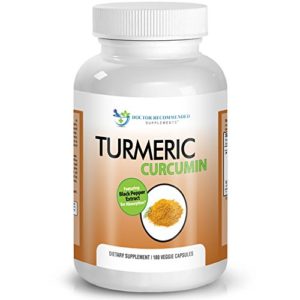
Click here for the lowest price on Amazon
As an incredibly popular supplement online, Doctor Recommended Supplements is surprisingly mediocre. Each capsule provides 750 mg of the company’s proprietary blend, which includes turmeric root and curcumin extract, as well as triphala powder, which is a completely different herbal supplement that’s primarily used in Ayurvedic dietary practices.
Now, how much of each of these compounds the supplement contains is a real puzzler. Because the blend is proprietary, the company doesn’t need to disclose it. If you are trying to follow a research-based supplement protocol, these kinds of labeling practices make it very difficult.
Part 2: An in-depth look at turmeric
Turmeric is a spice containing curcumin, a powerful antioxidant with a long and respected history of medicinal use in India and other eastern countries.
Scientific studies of curcumin, the active ingredient in turmeric, confirm it has much more to offer than the distinctive yellow or gold coloring it imparts to curry dishes. Besides working to rid the body of free radicals caused by oxidation, it has extremely beneficial effects on inflammation. (1)
Curcumin is the most important of the curcuminoids contained in turmeric, but two factors make it difficult to get a significant amount of this spice through diet.
It occurs in very small amounts at about 3% by volume of turmeric powder (2)
Since medicinal dosages of curcumin usually run at a gram or more daily, eating enough turmeric to get an appreciable amount of curcumin through diet isn’t practical. Purchasing an encapsulated extract to deliver the recommended dosage solves this problem.
Curcumin isn’t well-absorbed, so extra measures are needed to get the benefits.
When taken in combination with piperine, a substance found in black pepper, absorption is enhanced by 2000%. (3) Eating curcumin with a meal containing fats is also helpful since curcumin is fat soluble.
Besides assisting the body with curcumin absorption, piperine (also known as bioperine) boosts uptake of other phytonutrients like lycopene and resveratrol. (4)
Let’s go over the other beneficial effects of the curcumin found in turmeric.
Benefits
While inflammation itself isn’t a bad thing – it’s actually part of the body’s process for repairing wear and tear, as well as mounting attacks against foreign substances like bacteria or viruses that don’t belong in the system – excessive and chronic inflammation can become problematic.
Chronic inflammation is implicated in a number of serious health disorders, including heart disease, cancer, Alzheimer’s, inflammatory conditions like rheumatoid arthritis, and diseases associated with obesity. (5, 6, 7)
In a clinical trial testing curcumin supplements with rheumatoid arthritis patients, those with the most improvement took curcumin alone; patients using curcumin in combination with an anti-inflammatory drug, as well as those using the pharmaceutical drug on its own, experienced less improvement. (8)
Even with established inflammatory conditions that have developed over a period of years, curcumin can offer as much or more help in normalizing the system as certain anti-inflammatory drugs. (9) When such powerful effects can be realized from a natural substance, avoiding pharmaceutical drugs and the possibility of detrimental side effects is an appealing option. (10, 11)
Being able to head off the development of inflammation on a molecular level is a powerful tool for keeping the body’s tissues in a healthy state. (12, 13, 14) Curcumin accomplishes this by blocking NF-kB, a molecule that enters the cell nuclei and switches on genes associated with inflammation. (15, 16)
The ability to soothe inflammation in early stages could also serve well as a preventative measure.
We hear a lot about antioxidants, which help reduce damage caused in the body by free radicals; these rogue molecules have unpaired electrons that react with protein, fatty acids and even DNA, leading to what’s referred to as oxidative damage.
Curcumin acts even more decisively in relation to free radicals than other antioxidants; its chemical structure neutralizes these trouble-makers (17, 18), then goes on to stimulate the body’s ability to produce its own antioxidant enzymes. (19, 20)
Along with Inflammation, oxidative damage is believed to be another factor contributing to the aging process (21), so adding a natural supplement that works to reduce both of these could be a winning two-punch for staying young and healthy.
The prospect of losing brain function as we grow older is a grim thought. Adding turmeric and curcumin to the diet of female rats improved memory (22), and further tests will help determine if the same effect can be achieved with humans.
Curcumin stimulates brain-derived neurotropic factor (BDNF), a growth hormone necessary for creating new brain cells. (23) Since BDNF levels affect the ability of neurons to generate new connections, it may play a role in keeping learning processes humming along, with the added benefit of helping reverse the effect of stress on the brain. (24)
Patients diagnosed with Alzheimer’s disease and depression, as well as other brain disorders, statistically register low levels of BDNF. (25)
Curcumin crosses the blood-brain barrier (26) going straight to where it can protect against degeneration of key brain functions , as well as clearing the build-up of beta amyloid plaques associated with Alzheimer’s disease. (27)
Heart disease is listed as the number one cause of death worldwide. (28) Recent studies indicate the curcumin found in turmeric may actually correct conditions leading to heart disease. (29)
The endothelium cells lining blood vessels affect clotting as well as pressure regulation. (30) Endothelium dysfunction raises the risk of heart disease; curcumin improves endothelium function, positively affecting this vital marker as efficiently as engaging in exercise or taking drugs. (31, 32)
Curcumin’s antioxidant and anti-inflammatory properties add more benefits for preventing heart disease; a recent study of heart disease patients indicated even a few days of taking supplements containing curcumin before surgery decreased the chance of a heart attack in the hospital by 65%. (33)
The overgrowth of cells involved with cancer differs greatly between types, but the active ingredient in curcumin appears to be effective in reducing tumor growth, stopping the spread of cancer, and even killing existing cancer cells. (34)
One study followed 44 men with colon lesions known to become cancerous; the curcumin dosage of 4 grams daily for 30 days reduced the amount of lesions present by 40%. (35)
These results show good promise for preventing cancer in the digestive system, and further studies may help determine whether curcumin can help treat or prevent other cancers as well.
Many health-conscious consumers are already using curcumin supplements to address inflammation issues, and a variety of products are available, including combinations with piperine for improved absorption.
Side Effects
Although no clear side effects have been shown with normal consumption, taking high dosages of turmeric can lead to nausea, diarrhea, and may interfere with anti-coagulants like aspirin and warfarin.
Summary: If you’re open to adding a natural supplement that could improve existing health disorders and offer great potential for prevention, turmeric looks like an excellent choice.
https://bodynutrition.org/turmeric/

No comments:
Post a Comment